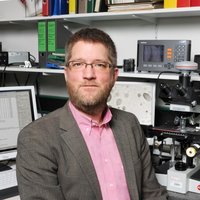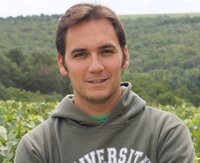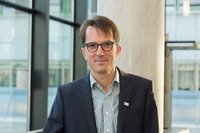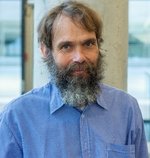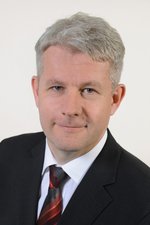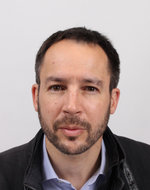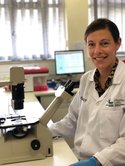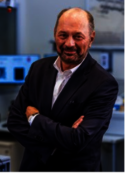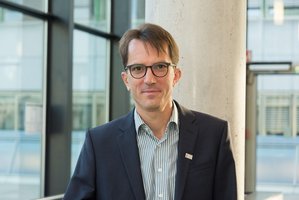Dr. Ralph Aßmann
Dr. Kristina Beblo-Vranesevic
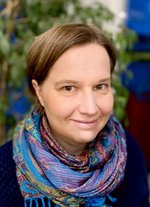
Trainer’s name: Kristina Beblo-Vranesevic
Trainer’s position: Research Scientist in the “Aerospace Microbiology Group”, DLR, Köln, D
Trainer’s email and phone number: Kristina.beblo@dlr.de; +49 2203 601 2194
Dr. Kristina Beblo-Vranesevic, a (micro)biologist by training, studied at the University of Regensburg. Since 2006 she has been working on her diploma and PhD thesis at the German Aerospace Center (DLR). As a member of the “Astrobiology Group” at DLR (2011-2024), and now as the deputy-head of the “Aerospace Microbiology Group”, her research interests include astrobiology, life in extreme environments, planetary protection, microbiology, and radiation biology. Besides microbiological laboratory work, including supervision of students and field studies, she is Co-I of several space experiments. She has several publications in peer-reviewed journals in her research area. Kristina Beblo-Vranesevic is a member of scientific committees and spokesperson of the VAAM Special Group "Space Microbiology".
Dr. Thomas Berger
Trainer’s name: Dr. Thomas Berger
Trainer’s position: Head Biophysics Group, Radiation Biology Department, DLR
Trainer’s email and phone number: thomas.berger@dlr.de; +49 2203 60131 35
Thomas Berger studied physics at the Technical University of Vienna (TUW), Austria and graduated with a PhD in radiation physics in 2003. In 2003 he joined the German Aerospace Center (DLR), Institute of Aerospace Medicine where he became leader of the Biophysics Research Group in 2009. At DLR his main research topic is radiation protection including the development of radiation detectors as well as investigations for the radiation load received by humans for missions beyond Low Earth Orbit (LEO). He is currently the Principal Investigator (PI) for the DOSIS 3D experiment aboard the International Space Station (ISS) and the Matroshka AstroRad Radiation Experiment (MARE) project which flew to the Moon (and back) with the NASA Artemis I mission at the end of 2022.
Dr. Marco Durante
Trainer's name: Prof. Dr. Marco Durante
Tainer's position: Director, Biophysics Department, GSI Helmholtzzentrum für Schwerionenforschung
Professor of Physics, Technische Universität Darmstadt, Germany
Trainer's position Email and phone number: m.durante(at)gsi.de, +49 (0)6159 71 2009
Prof. Dr. Marco Durante has dedicated his research efforts to the biophysics of high-energy charged particles, with applications in cancer therapy and space radiation protection. He is generally recognized as world leader in the field of particle radiobiology and medical physics and is co-author of over 450 papers in peer-reviewed scientific journals (h-index=57) and one patent on proton therapy. He is currently chair of the ESA Topical Team on Space Radiation and of the Particle Therapy Co-Operative Group (PTCOG). Prof. Durante has been awarded several prizes for his contributions to charged particle biophysics, including the 2013 IBA-Europhysics Award for Applied Nuclear Science and Nuclear Methods in Medicine (European Physics Society), the 2013 Bacq & Alexander award of the European Radiation Research Society (ERRS), and the 2020 Failla award of the Radiation Research Society (RRS). He is recipient of an ERC Advanced Grant in 2020 on particle.
Dr. Anna Fogtman
Dr. Christer Fuglesang
Dr. Rubén García Alía
Trainer’s name: Rubén García Alía
Trainer’s position: Radiation effects physicist at CERN
Trainer’s email, phone number: Ruben.garcia.alia(at)cern.ch; +41 (0)754118490
Rubén García Alía is part of the “Radiation to Electronics” (R2E) project at CERN, which he leads since 2018. After having studied nuclear and high-energy physics in the Complutense University in Madrid (Spain), he started his career in radiation effects as a Young Graturate Trainee at the European Space Agency, in the Netherlands. From there, he moved to completing his PhD with CERN and the University of Montpellier, focusing on the effect of highly energetic particles on Single Event Effects in the LHC accelerator. During this period, he was recognized with the “Best Student Paper” award in RADECS 2012, and the Paul Phelps Award in 2015. Since then, he has kept a strong involvement in radiation effects research with, focusing on high-energy accelerator applications, and has co-authored more than 75 publications in peer reviewed journals. He has also co-authored a RADECS Short Course, has been session chair at NSREC and RADECS, and is currently technical chair for RADECS 2021. Recently he was elected Junior Member-at-Large of the Radiation Effects Steering Group (RESG).
At CERN, his main task is that of managing the R2E project, which is responsible for all aspects linked to radiation effects in the LHC accelerator and its injector chair, with the mandate of ensuring its successful operation with regards to stochastic failures and lifetime degradation induced by radiation. The project, which is composed of more than 50 members, embeds a rich variety of activities and expertise, ranging from the monitoring and calculation of radiation levels, through the operation of CERN radiation facilities, and up to radiation effects testing at both component and system level.
Rubén is also coordinating the RADSAGA Marie Curie PhD network since 2017, and led the RADNEXT proposal for creating a radiation test infrastructure network in Europe, which was accepted for funding and was kicked off in June 2021.
Dr. Christian Graeff
Trainer’s name: Christian Graeff
Trainer’s position: Group leader Medical Physics
Trainer’s email and phone number: c.graeff@gsi.de, +496159711848
Prof Dr. Christian Graeff received his PhD in Biomedical Engineering at the Hamburg University of Technology in 2010. Since 2012, he is group leader of Medical Physics in the Biophysics department of GSI, Darmstadt, Germany, since 2018, he is the deputy scientific director of this department and since 2021 Professor for Technology of Radiotherapy at TU Darmstadt, Germany.
His main research interest are advanced treatment planning and delivery strategies for particle therapy, in particular for moving targets. Dr Graeff devised 4D-optimization strategies for conformal motion mitigation, which his group implemented in treatment planning and dose delivery systems.
Dr. Christine Hellweg
Dr. Burkhard Jakob
Trainer’s name: Burkhard Jakob
Trainer’s position: Group Leader Molecular Radiobiology & Imaging
Trainer’s email and phone number: b.jakob@gsi.de; +49 6159 71 2608
Prof. Dr. Burkhard Jakob studied Chemistry and graduated with a PhD (Dr. rer nat) in 1998 from the Julius-Maximilians University of Würzburg in Germany. In 1999, he commenced his position at the DNA Repair Group within the Biophysics Department at GSI (Helmholtz Centre for Heavy-Ion Research) in Darmstadt. His research focused primarily on the molecular mechanisms of DNA repair and dynamic aspects of the DNA damage response following the exposure of cells to densely ionising radiation by utilising advanced live cell microscopy techniques. Since Jan 2019 he is leading the group of Molecular Radiobiology & Imaging and was appointed as Honorary Professor in the Department of Biology at the Technical University of Darmstadt in 2021.
Dr. Piers Jiggens
Dr. Kuypers Maybritt
Dr. Livio Narici
Dr. Radek Pleskac
Trainer’s name: Dr. Radek Pleskac
Trainer’s position: FAIR/APPA coordinator for BIOMAT project
Trainer’s email and phone number: R.Pleskac(at)gsi.de, +49-6159-71 2432
Radek Pleskac obtained his PhD in nuclear physics at the Charles University in Prague, the Czech Republic in 2003. His work was devoted to experimental study of properties of hot and dense nuclear matter created during relativistic heavy-ion collisions within the TAPS and HADES scientific program.
In 2004 he was awarded with a EURATOM fellowship for 2-years stay at GSI Darmstadt to measure selected spallation cross-sections at FRS (Fragment Separator) relevant for future accelerator driven systems.
In 2007 he moved to the biophysics department at GSI Darmstadt and his fields of interest was experimental study of nuclear fragmentation processes relevant for space research and tumour therapy. He was a person of charge for the FIRST (Fragmentation of Ions Relevant for Space and Therapy) experiment performed in 2011 and also for the irradiation facility in cave A.
Since 2013 he is the resource and technical coordinator for the BIOMAT project within the APPA pillar. He coordinates planning and realization of the BIOMAT experimental facility at future FAIR.
Dr. Thomas Reiter
Andreas Rudolph
Dr. Giovanni Santin
Trainer’s name: Dr. Giovanni Santin
Trainer’s position: ESA Space Environment and Effects analyst
Trainer’s email and phone number: Giovanni.Santin(at)esa.int; 0031715656267
Dr. Giovanni Santin works in the European Space Agency Environments and Effects section, where his focus is project support in the understanding of radiation-induced risks, uncertainties and solutions. He manages R&D covering radiation transport and innovative shielding, and he oversees the development of radiation monitors for Earth orbits and interplanetary missions. He studied Physics in Trieste, Italy, where he also obtained his PhD, studying neutrino oscillations in reactor and beam experiments. After two exciting periods at CERN, Geneva, and in Lausanne, he joined the ESA team in 2002. Since 2014 he is Honorary Visiting Fellow at the University of Leicester.
Dr. Christoph Schuy
Dr. Charlot Vandevoorde
Trainer's name: Dr. Charlot Vandevoorde
Tainer's position: Space Radiobiology Group Leader
Trainer's position Email and phone number: vandevoorde(at)tlabs.ac.za; +27 66 2079647
Dr. Charlot Vandevoorde is a radiation biologist, who obtained her PhD in Health Sciences at Ghent University in 2015, followed by a post-doc at iThemba LABS in South Africa. In 2018, she was appointed as acting manager of the Radiation Biophysics Division at iThemba LABS, with research programs in particle therapy, nuclear medicine and radiation protection. During this period, she gained extensive experience in accelerator produced particle beams for biomedical applications, including ground-based experiments with different space stressors. Together with local collaborators, she launched the South African Space Neutron Initiative (SASNI) and organized an annual 2-weeks radiobiology course at iThemba LABS for postgraduate student from various (South-) African universities. In September 2022, she joined GSI-FAIR as group leader Space Radiobiology.




